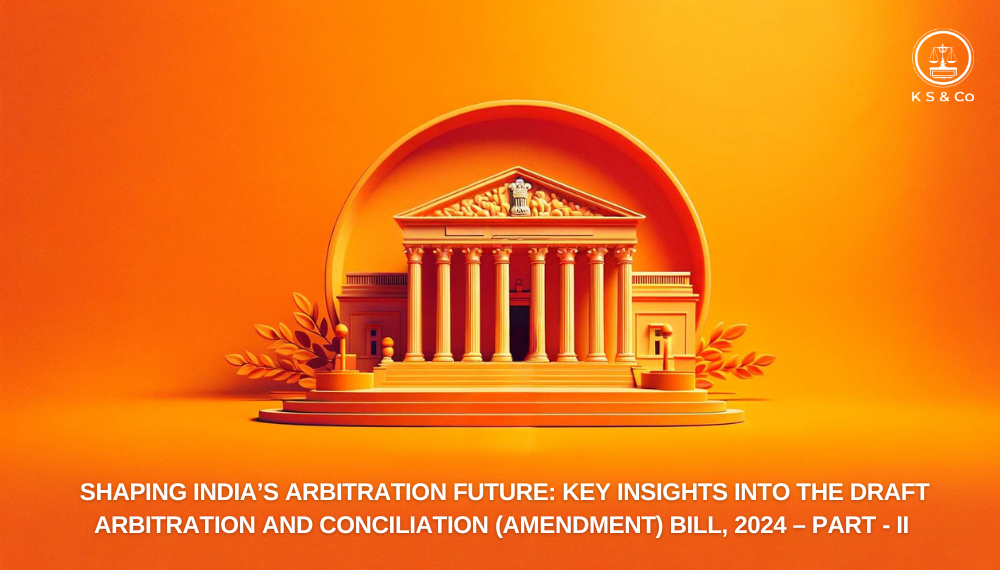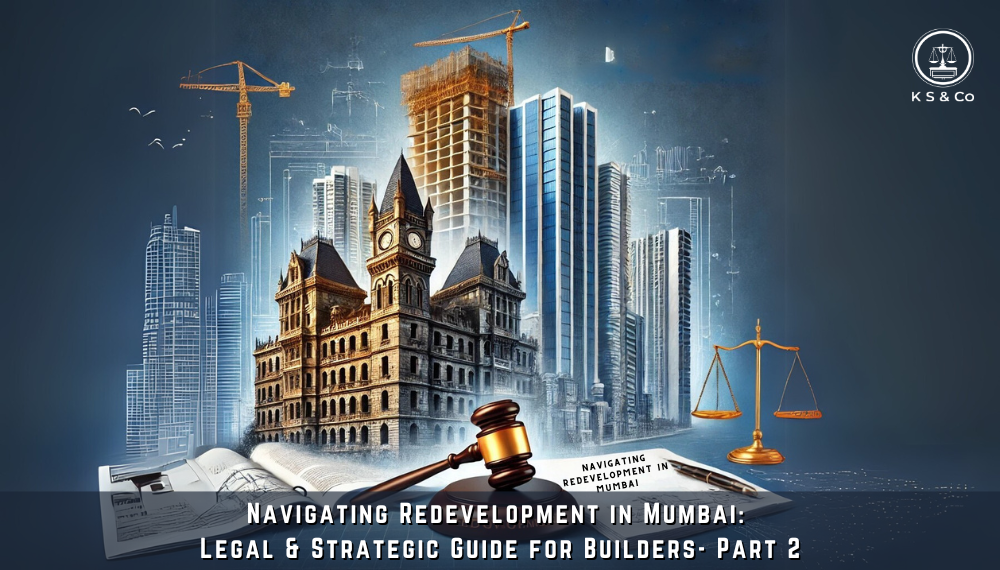India has significantly advanced its approach to arbitration, aiming to establish itself as a global hub for dispute resolution. With increasing support from Indian courts for the finality of arbitral awards and enforcement of foreign awards, alongside institutions like the Mumbai Centre for International Arbitration (MCIA), the country is poised to become a preferred destination for arbitration. On 3rd November 2024, the Indian government concluded a public consultation process on the draft Arbitration and Conciliation (Amendment) Bill, 2024, which aims to address persistent challenges and refine India’s arbitration framework. Let us explore the key provisions of the draft Bill and their potential impact on India’s arbitration landscape.
1. Establishment of Appellate Arbitration Tribunal
The draft Bill proposes a significant change with the establishment of an Appellate Arbitration Tribunal, which will have the authority to entertain and set aside Section 34 applications, traditionally handled by courts. This step aims to reduce judicial intervention and streamline the dispute resolution process. However, the dual system could lead to inconsistencies in jurisprudence and create confusion. While the Appellate Tribunal will handle cases where parties approach it, in cases of ad-hoc arbitration or when parties avoid the Tribunal, courts will retain the authority to entertain Section 34 applications. The lack of clear guidelines on constituting these Tribunals raises concerns about further judicial involvement.
2. Synchronization of Arbitration and Mediation- Section 30(2)
A notable feature of the draft Bill is its alignment with the Mediation Act, 2023. Section 30(2) of the Arbitration & Conciliation Act now stipulates that any settlement reached during arbitration will be enforced under the Mediation Act 2023. This change underscores the growing importance of mediation as a primary dispute resolution tool and introduces a structured approach to enforcing settlement agreements, offering a more integrated dispute resolution process.
3. Integration of Domestic and International Commercial Arbitration- Section 34(2-A)
The proposed amendment to Section 34(2-A) removes the distinction between domestic and international commercial arbitration in the grounds for challenging awards on the basis of patent illegality. This change, which is controversial, broadens the scope for challenging awards in international commercial arbitrations. The 2015 Amendment previously excluded this ground for international commercial arbitration to attract foreign investment. Eliminating this distinction may deter international investors, potentially undermining India’s attractiveness as an arbitration hub.
4. Extension of the Patent Illegality Test
The draft Bill extends the patent illegality test to international commercial arbitrations, reintroducing the ONGC vs. Saw Pipes regime. While this extension aims to create a uniform approach, it may have a regressive impact by making international commercial arbitrations less appealing in India. This change could push foreign parties to opt for alternative arbitration jurisdictions, harming India’s prospects as a seat for international arbitration.
5. Settling the Seat vs. Venue Debate- Section 20
The draft Bill proposes amendments to Section 20 of the Arbitration and Conciliation Act, 1996 to address the longstanding debate between the “seat” and “venue” of arbitration. Two options are suggested: either replacing the term “place of arbitration” with “seat” or “venue” as appropriate, or designating the place where the contract is executed or where the cause of action arises as the seat for domestic arbitrations in India. This clarification provides greater certainty in determining jurisdictional issues in arbitration. Amendments shall be made to make India a Pro-Arbitration Jurisdiction and certain provisions causing some kind of hindrance for smooth function of Arbitration Tribunal are taken away and has thus removed the delay of arbitration procedure and execution of foreign awards.
6. Provision for Emergency Arbitration- Section 9A
A commendable addition to the draft Bill is the introduction of a provision for emergency arbitration, aligning with practices from international jurisdictions. Section 9A ensures that emergency arbitration orders are enforceable under Section 17(2), reinforcing the effectiveness of interim relief in arbitration. This change strengthens the arbitration framework by providing a mechanism for urgent relief before the formation of an arbitral tribunal, which was previously lacking in the Indian system.
7. Partial Setting Aside of Awards
The draft Bill introduces the possibility of partial annulment of arbitral awards, an important progressive step. However, the framework should have clarified that partial annulment is only permissible where the impugned portion is severable and does not impact the enforceability of the remaining award. This provision ensures greater flexibility and avoids the complete setting aside of awards over minor issues.
8. Embracing Technology in Arbitration – Section 2(1)(a)
The draft Bill modernizes arbitration by explicitly including virtual arbitration in the definition under Section 2(1)(a) and recognizing arbitration agreements executed using digital signatures. This change addresses contemporary practices like virtual hearings and digital transactions, making the arbitration process more adaptable to the evolving digital landscape. It will also help facilitate a more efficient and accessible arbitration process, particularly for cross-border disputes.
9. No Recourse to Section 9 During Arbitral Proceedings
The draft Bill introduces a significant change in Section 9(1), barring parties from filing applications for interim relief under this provision once arbitration proceedings have begun. This amendment aims to streamline the interim relief process under Sections 9 and 17 but could create challenges, especially in cases involving foreign tribunals. Without the option for Indian courts to enforce interim relief, parties may face difficulties in securing protection for assets or interests pending arbitration.
10. Provision for Appeals Against Refusal to Appoint Arbitrators
The draft Bill addresses an important gap by introducing Section 37(aa), which allows parties to appeal against the refusal of courts to appoint arbitrators under Section 11. This amendment ensures consistency and fairness in appellate rights, addressing the issue highlighted in Pravin Electricals (P) Ltd. v. Galaxy Infra and Engg. (P) Ltd., where such appeals were previously unavailable.
11. Model Arbitration Agreement
To simplify arbitration processes, the draft Bill mandates the Council to frame a model arbitration agreement under Section 7(6), which parties can incorporate into their contracts. This provision aims to reduce interpretational issues and standardize arbitration agreements, ensuring greater clarity and reducing disputes related to the validity of agreements.
12. Stamping of Arbitration Awards
The draft Bill introduces a requirement for stamping arbitral awards under the Stamp Act, 1899. This provision addresses potential delays in enforcement due to stamping issues, helping streamline the post-award process and ensuring that awards are enforceable without unnecessary procedural delays. However, there are certain concerns that by making the stamping of the arbitration agreement mandatory and the stamp rates would make arbitration a secondary choice to litigation.
To get more insights on this read our article published in Indian Women in Indian Arbitration blog at https://blogiwia.wordpress.com/2024/12/16/maharashtras-new-stamp-duty-ordinance-2024-a-game-changer-for-arbitration
13. Checklist for Arbitration Awards- Section 31(2-A)
Section 31(2-A) of the Bill introduces a procedural checklist to ensure that critical aspects such as party capacity, the validity of the arbitration agreement, and proper notice are verified before an award is issued. This provision enhances procedural integrity, reducing the likelihood of awards being challenged for technical or procedural deficiencies.
14. Accountability for Both Parties- Section 31-A(3)(c)
The proposed amendment to Section 31-A(3)(c) broadens the Tribunal’s authority to assess whether either party has made frivolous claims or counterclaims. This change promotes fairness by ensuring that both claimants and respondents are held accountable for baseless actions, encouraging parties to pursue legitimate claims.
15. Bifurcation of Grounds for Setting Aside an Award- Section 34(7)
A key amendment in the Bill is the introduction of a distinction between grounds for setting aside an award entirely and grounds for partial annulment. The new Section 34(7) clarifies that when an award is partially set aside, only the contested issues need to be reconsidered by the Tribunal. This provision brings India’s arbitration law in line with international standards and improves the efficiency of the arbitration process.
16. Formulation of Grounds of Challenge
The draft Bill introduces Section 34(1-B), which mandates that courts or Appellate Tribunals identify specific grounds for considering challenges to an award. This provision narrows the scope of challenges and encourages more focused, substantive disputes, which is consistent with the aim of reducing judicial interference in arbitration.
Amendments to Timelines
| Section | Existing Provision | Proposed Amendment |
| Section 8 | No timeline. | Shall be disposed of within 60 days. |
| Section 11 | No timeline. This lacuna was brought to the attention by the Supreme Court in the case of BSNL v Nortel Networks India (P) Ltd.[1] where it was held that Section 11 governed by residuary article in Schedule of Limitation Act 1963. Thus timeline of 3 years- however such long period is contrary to intent of expeditious resolution of commercial disputes.
And then in the case of Arif Azim Co. Ltd v Aptech Ltd.[2] where it was held that parties have period of 3 years for filing Section 11 petition from date of invoking arbitration unless claims to be raised therein are manifestly time barred. |
Section 11 petition shall be filed within 60 days of failure of appointment of arbitrator rectifying the legislative vacuum while preserving the objective of speedy trial. |
| Section 16 | No timeline. | Shall be decided as a preliminary issue within 30 days of filing. |
| Section 9 | When section 9 application is filed before the commencement of the arbitration, Arbitral proceedings shall commence within 30 days from the date of passing of the order in the application. | Suggest it shall be rather 90 days from the date of filing of application before the court. |
| Section 37 | No limitation for filing an appeal and is currently calculated as per CPC based on the kind of order under appeal. | Suggests Section 37 applications shall be filed within 60 days from the date of receipt of order appealed against irrespective of the kind of order. |
Analysis
The proposed amendments to India’s arbitration laws aim to align with international standards, reduce delays, and establish the country as a favorable arbitration hub. These changes address long-standing challenges, making the process faster, more predictable, and appealing to both domestic and international parties. The Ministry of Law and Justice has engaged a broad range of stakeholders in the consultation process, ensuring the amendments meet the needs of all involved. Legal professionals are cautiously optimistic, welcoming the emphasis on institutional arbitration and reduced judicial intervention, though concerns remain about the complexity and costs of new mechanisms like appellate tribunals.
These amendments reflect India’s long-term strategy to become a preferred arbitration destination, recognizing arbitration’s growing importance in commercial activity. As the global business environment evolves, India’s arbitration framework must adapt to remain competitive and meet the demands of businesses and investors. The government’s commitment to a more efficient system offers hope for a faster and more effective arbitration process.






